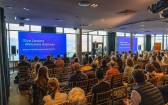Shaping our Community News Blog
We hear you: What we're doing to rebuild confidence in Council
Let's be honest, there's been a lot of talk about mistrust and leadership at QLDC. And while some of it is just that—talk—there's also a deeper truth we need to acknowledge: trust in Council has taken a hit.
The most recent Community Insights Survey revealed that only 17% of respondents were satisfied with the leadership of the Mayor and Councillors. That's not a number we can ignore. Yes, it's based on 405 responses, and yes, it doesn't tell the whole story but it does tell us something important: people are feeling disconnected, unheard, and unsure about how decisions are being made.
That matters. And it's on us to fix it.
Building trust one step at a time
There's no quick fix for rebuilding trust. It takes time, consistency, and a willingness to front up—even when things aren't perfect. That's what we've been trying to do.
- We continue to livestream full Council meetings
- We record all committee and hearing meetings.
- For the first time in QLDC history we opened workshops to the public and now record those too, so people can watch them in their own time.
These are big steps toward transparency, and they've come from a genuine desire to open the doors wider.
But transparency isn't just about livestreams and meeting minutes. It's also about how we respond when people ask for information.
The LGOIMA Challenge
The Chief Ombudsman recently reviewed how QLDC handles official information requests under the Local Government Official Information and Meetings Act (LGOIMA). The good news was that QLDC scored top marks for its internal culture of openness. It revealed that 96% of staff surveyed said Council is strongly or moderately pro-transparency, which was the highest result of the five local authorities investigated by the Ombudsmen.
The Council's LGOIMA team was found to be well-trained, respected, and committed to timely, high-quality responses. It stated that staff demonstrated good practice, often providing plain-English explanations when withholding information and even flagging when it might be released later.
One of the biggest challenges for us is the volume of requests coming in. We've had to increase staffing to keep up with the number of requests—many of them from the same individuals or organisations. It's a big investment, but it reflects the scale of the demand and our legal obligation to respond.
Where things need work
Despite the strong internal culture, public perception tells a different story. Some residents feel decisions are made "behind closed doors," and that their voices aren't being heard. Training gaps were also identified. While approximately 70% of staff had received LGOIMA training, 30% had not, and some existing materials needed updates to reflect recent legal changes and better explain key concepts, such as public interest tests.
The most significant finding from the Ombudsman was the Council's handling of some media information requests. Specifically, QLDC did not always meet its legal obligations under section 18 of the LGOIMA, which requires councils to:
- Provide a clear reason when refusing a request, and
- Inform the requester of their right to complain to the Ombudsman.
What we're doing about it
We've committed to all 26 of the Ombudsman's recommendations. That includes better training for staff and elected members, clearer communication with media, and stronger policies for releasing information from closed meetings when it's no longer sensitive. The Democracy Services team will lead the implementation, with support from senior leadership, which shows we are taking the issue seriously and have a genuine desire to improve.
The good news is that the Ombudsman is satisfied with our response to the investigation and has deemed it unnecessary to make a recommendation. He noted," This response from the Council is very encouraging and I look forward to following up on its progress over the coming months."
But beyond the technical fixes, we'll continue to work hard to shift public perception of Council. That means listening more and being more available. And recognising that while there are many parts of the community trust us, others don't.
A better way forward
There's a lot that gets thrown around on Facebook. Some of it's fair. Some of it's not. But behind the scenes, there are good people working hard to serve this district. Every substantive decision in the last three years has passed. That's not dysfunction, that's progress, even if it doesn't always look like it from the outside.
We know we've got work to do. We're not brushing that off. But we're also not standing still. We're showing up, we're listening, and we're committed to doing better.
QLDC proactively releases LGOIMA responses, you can view them here.
You can read the full Ombudsmen's Report here

